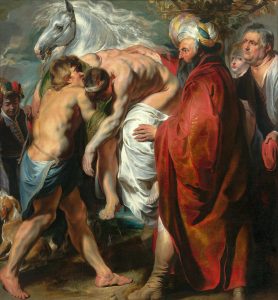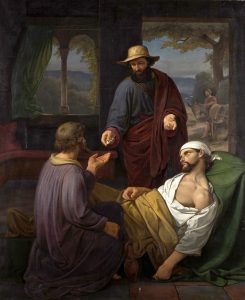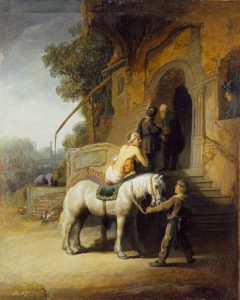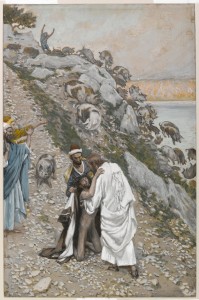Illuminations on the Lectionary readings for July 13, 2025 (Pentecost 5C/Proper 10)

The Good Samaritan (c.1616), oil painting on canvas by Jacob Jordaens (1593-1678). Louvre Abu Dhabi. (Click image to enlarge.)
First Reading (Track One): Amos 7:7-17
The great commandment to love God and to love our neighbor echoes through Sunday’s readings, culminating in the beloved story of the Good Samaritan. We have to listen closely to find its shadow in our Track One first reading, though, as we hear the angry prophet Amos foretelling gloom and destruction, warning of an angry God who threatens to lay waste to the promised land that God once protected. Israel’s high priest, Amaziah and King Jeroboam both want Amos to shut up, go home to Judea, and leave them alone. Why is Amos so angry? Israel has failed to be righteous. Like the priest and the Levite in the Good Samaritan story, the people of Israel have failed to love their neighbors as themselves, breaking the sacred covenant that the people made at Sinai.
First Reading (Track Two): Deuteronomy 30:9-14
Our Track Two first reading recalls the deep history and tradition of the commandment to love God with all our hearts and with all our souls. These verses from Deuteronomy remind the people that God took delight in assuring their prosperity because they turned to God with just this abundance of love. Indeed, we hear these same words again in Sunday’s Gospel when the lawyer responds to Jesus’ invitation to describe the law. And just as Jesus goes on to demonstrate in the parable of the Good Samaritan, the most basic instruction of the law – Torah, God’s beloved teaching – is to love God and to love our neighbors as ourselves.
Psalm (Track One): Psalm 82
The great commandment to love God and our neighbor runs like a great river through both testaments. Moreover, Scripture leaves us in no doubt whatsoever that this duty requires us to preferentially love and care for the weak, the poor, and the oppressed. The Psalmist sings, “Give justice to the weak and the orphan … the lowly and the destitute … the weak and the needy.” Just as Jesus showed us in the parable of the Good Samaritan, so are we called to love our neighbors – all of our neighbors – as we love God.
Psalm (Track Two): Psalm 25:1-9
Attributed by tradition to King David, this hymn of praise expresses the joy of holding up our hearts and souls with willing trust in God’s everlasting compassion and steadfast love. The Psalmist’s call for protection against enemies might seem far afield from the Good Samaritan’s action at first. But then, in a sudden turn, they call on God to lead us in truth and teach us. As God guides the humble and teaches God’s way to the lowly and to sinners, so are we called to keep God’s covenant to love our neighbors … as the Samaritan models for us.
Second Reading: Colossians 1:1-14
Now we begin a three-week visit with the letter to the people of Colossae, a small city in Asia Minor (now Turkey). Although the letter’s opening phrases name Paul as the author, most modern Bible scholars believe this letter was written in Paul’s name by a later follower. The letter begins with hopeful, prayerful words: He prays for them constantly. He is glad that their new faith is bearing fruit. He prays that they will love one another, grow in good works and knowledge of God, gain strength, and be prepared to endure whatever comes their way for their love of Christ.
Gospel: Luke 10:25-37
Imagine the parable of the Good Samaritan from a new perspective: Put yourself in the place of the injured person on the side of the road. You are injured, bleeding, scared. Distinguished-looking people pass by, ignoring you. Then someone different and scary approaches. It’s a person you might instinctively cross the street to avoid. But then when they tenderly nurse your wounds and take you for help at their expense. How would you feel? How would this experience change you? This is the way that Jesus answered a lawyer’s question, “Who is my neighbor?” We must see everyone as our neighbor. Jesus responds: Not just the friend who looks like us, but those who are different; even those we view as enemies.




